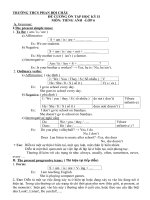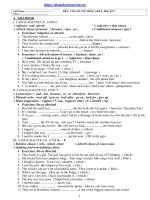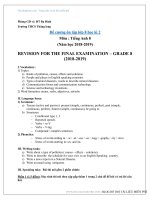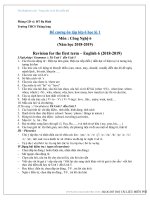Đề cương ôn tập Tiếng Anh 6 học kì 2 (2010-2011).
Bạn đang xem bản rút gọn của tài liệu. Xem và tải ngay bản đầy đủ của tài liệu tại đây (100.83 KB, 3 trang )
TRƯỜNG THCS PHAN BỘI CHÂU
ĐỀ CƯƠNG ÔN TẬP HỌC KỲ II
MÔN: TIẾNG ANH -LỚP 6
A. Grammar:
I.The present simple tense:
1. To Be: ( am / is / are )
a) Affirmative:
S + am / is / are + …………
Ex: We are students.
b) Negative:
S + am / is / are + not + …………
Ex: My mother is not ( isn’t ) a farmer.
c) Interrogative:
Am / Is / Are + S + ……………….?
Ex: Is your brother a worker? → Yes, he is / No, he isn’t.
2. Ordinary verbs:
a) Affirmative: ( xác định )
I / We / You / They / S ( Số nhiều ) V
He / She / It / S ( số ít ) V( s / es )
Ex: I go to school every day.
She goes to school every day.
b) Negative: ( phủ định )
I / We / you / they / S ( số nhiều ) do not ( don’t) V(bare
infinitive)
He / She / It / S ( số ít ) does not( doesn’t )
Ex: I don’t go to school on Sundays.
She doesn’t go to school on Sundays.
c) Interrogative( nghi vấn)
Do We / you / they / …. V(bare
infinitive ) ?
Does He / she / …….
Ex: Do you play volleyball? → Yes, I do
No, I don’t
Does Lan listen to music after school? -Yes, she does
No, she doesn’t
+ Use: Diễn tả một sự thật ở hiên tại, một quy luật, một chân lý hiển nhiên
Diễn tả một thói quen,môt sự việc lặp đi lặp lại ở hiện tại, một phong tục.
Thường đi kèm với các trạng từ như: always, usually, often, sometimes, never,
every …
II. The present progressive tense: ( Thì hiện tại tiếp diễn)
1. Form:
S + am / is / are + V- ing + ….
Ex: I am teaching English.
She is playing computer games.
2. Use: Diễn tả một sự việc đang xảy ra ở hiện tại hoặc đang xảy ra vào lúc đang nói ở
hiện tại. Trong câu thường có các trạng từ chỉ thời gian như now (bây giờ), at present, at
the moment ( hiện giờ, vào lúc này ) thường nằm ở cuối câu, hoặc theo sau câu đặc biệt
như Look!, Listen!, Be careful!,
Ex: The farmers are working in the fields now.
Look! The boy is playing basketball.
III. Be going to : ( thì tương lai gần )
1. Form:
a) Affirmative:
S + be going to + V ( bare infinitive )
Ex: I’m going to visit Hue citadel tomorrow.
b) Negative:
S + be not going to + V ( bare infinitive )
Ex: Nam is not going to go to HCM.
c) Interrogative:
Be going to + S + V ( bare infinitive )…?
Ex: Are they going to go to the movies with us next Sunday?
2. Use: Diễn tả môt dự định sẽ xảy ra trong tương lai gần. Trong câu thường có các trạng
từ chỉ thời gian như tonight, tomorrow, next week ( month, year, ….).
III. Comparisons: ( So sánh )
1.Comparative: ( So sánh hơn )
a) So sánh hơn của tính từ ngắn và trạng từ ngắn:
S1 + V + adjective/ adverb – ER + than + S2
Ex1: This book is older than that one / that book.
2.Superlative: ( So sánh nhất )
a)So sánh nhất của tính từ ngắn:
S + to be + THE +Adjective - EST + …
Ex: Lan is the tallest student in my class.
b) Ngoại lệ:
Adjective Comparative Superlative
good/ well ( tốt) better ( tốt hơn) the best ( tốt nhất)
many/much ( nhiều) more( nhiều hơn) the most ( nhiều nhất)
little ( ít ) less ( ít hơn ) the least ( ít nhất )
IV. Suggestions and Invitations:
Let’s
V ( Bare infinitive ) ?
Why don’t we/ you
What about + V -ing ?
Reponses: Agree: OK / Great ? I’d love to / Yes, let’s
Disagree: I’m sorry, I can’t / No, let’s not
V. Adverbs of frequence : always, usually, often, sometimes, never
Cách dùng: - Đứng ngay trước động từ thường
- Đứng sau động từ “ to be “
VI. Pattern :
1/ Hỏi số lượng: How many + danh từ số nhiều ?
How much + danh từ không đếm được ?
2/ Hỏi màu sắc: What color ?
3/ Hỏi cảm giác: How do/does feel ?
4/ Hỏi mức độ thường xuyên: How often ? ( always/ usually / often…
once /twice/ threetimes aweek/ day/
month….)
5/ Hỏi thời tiết: What’s the weather like ?
What weather do/does like?
6/ Hỏi về các hoạt động trong mùa: What do you do when it’s hot?
7/ Hỏi về môn thể thao thích chơi: Which sports do/ does do?
8/ Hỏi về đồ ăn, thức uống ưa thích.
9/ Hỏi lịch sự về ý thích: What would like?
10/ Hỏi về loại thức ăn dùng trong các bữa ăn: What do/ does have for ?
B. TỪ VỰNG:
Học thuộc từ vựng chỉ về các bộ phận cơ thể, các tính từ mô tả về hình dáng, màu sắc,
các từ chỉ cảm giác như hungry/ thirsty/ full/ hot/ cold/ tired;
Học thuộc các từ về FOOD như: apples, oranges, bananas, rice, meat, chicken, bread,
vegetables, tomatoes, potatoes, carrots, beans, peas, cabbages onions, và DRINK như:
water, milk, orange juice, soda, iced tea, iced coffee, apple juice.
Học thuộc các từ chỉ thức ăn, thức uống (tiếp theo bài trước), các tính từ bộ phận
(partitive adjectives) như: a box of , a can of , a packet of , a bottle of , a kilo of ,
half a kilo of , five kilos of , 200 grams of , a tube of , a bar of , a dozen (eggs).
Học thuộc các từ chỉ các hoạt động thể thao và giải trí: Play badminton/ soccer/
volleyball/ tennis/ table-tennis/ video games; swim/ jog/ skip/ fly a kite/ do aerobics/
listen to music/ go fishing/ go camping/ go to the park/ go to the zoo/ have a picnic/
read ; các từ nói về thời tiết và mùa như: spring/ warm; summer/ hot; fall (autumn)/
cool; winter/ cold; các từ nói về kế hoạch / dự định trong các kỳ nghỉ , thời gian rảnh.
Đề nghị (suggestions): Let’s ; What about (V-ing ?); Why don’t we ?; Trạng từ:
tonight/ tomorrow.









